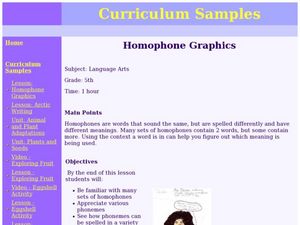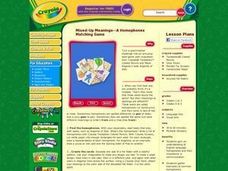Curated OER
Homophone Graphics
Fifth graders create homophones in a group and share them with the class. In this language arts lesson, 5th graders draw a homophone set. Additionally, students create a sentence using the homophone.
Curated OER
Mixed-Up Meanings--A Homophones Matching Game
Students grasp the concept of homophones and their importance in everyday communication with others. They gather examples of common homophones and fabricate a simple language arts game based on matching two homophones correctly together...
Curated OER
Choose the Correct Homophone II
Homophones are tough! Identify different homophones and how they're different. Common ones like son and sun and plain and plane are included. Some uncommon ones are also included, like bridal and bridle.
Curated OER
Homophones and Homonyms
Whether or not your class has heard of homonyms, they'll herd together to complete a language worksheet! With examples of both homophones and homonyms, the worksheet prompts learners to come up with additional pairs of words that sound...
Curated OER
Homophone Hunt
What is a homophone? Review the definition with your class before sending them off for this independent activity. As they read the story, they search for any homophones used incorrectly.
Curated OER
Homophones: Fun with Puns
What is a homophone for aloud? Or right? Fifth graders complete a list of 24 homophones, choosing another word that sounds like a given word but has a different meaning. At the bottom of the page, they write punning sentences to practice...
LearnEnglishFeelGood.com
There, They're, Their
Accompany a there, they're, and their lesson or test your pupils' comprehension with a grammar activity where scholars read sentences and fill in the blank with the appropriate form of the word.
Curated OER
Grammar Practice: They're, Their, and There
Clear up the differences between there, they're, and their once and for all! A helpful reference sheet clarifies when to use each word, and the next page includes ten practice sentences. A set of answers is available, but it is directly...
Curated OER
Double Jeopardy-Homophones
Second graders identify homophones as words that sound alike but have different meanings. They, given a pair of homophones, are to explain the meanings of the words using gestures, role playing, or drawing a picture with their partner.
Arizona State University
They're, Their, and They're
Clear up the difference between they're, their, and there once and for all! A reference sheets outlines when your learners can use each word, and ten practice sentences encourage them to fill the appropriate word in the blank. Use this...
Curated OER
Homophones
In this recognizing homophones instructional activity, students read lists of homophones and write their definitions. Students write 70 answers.
Curated OER
Goldie Girl and There, Their, and They're: Homophones and Homographs
Instruct your class on homonyms and homophones. Learners take a pre-test and examine a list of homophones. They also play online word games to practice spelling and usage and write a fairy tale in which they use at least 10 homophones....
Curated OER
Homophones Activities 1-5
In this language arts activity, students discover that homophones are words that sound alike. Students complete 5 activities with homophones: matching words to pictures, completing sentences, explaining differences between words and...
Mrs. Warner's Learning Community
Their There They’re
There's a great way for your learners to practice their homophones, and they won't even realize they're studying! A baseball-themed worksheet prompts your class to fill in there, they're, or their in the appropriate spaces.
Curated OER
Using Homophones
Never mix up principle and principal again with a helpful homophones worksheet. Featuring ten pairs of words that have the same sounds but different meanings, the worksheet prompts your class to fill in the blanks with the appropriate...
Curated OER
Dolch Homophones
In this effective language arts instructional activity, students study homophones and practice using the correct words as they fill in the blanks to sentences. Sentence ideas are provided in the instructional activity, as is a very nice...
Curated OER
Homophones
In this homophones worksheet, students read sentences and underline the incorrect word in the sentence while they provide the sentence with the correct homophone. Students complete 15 sentences.
Curated OER
Homophones
Here is a terrific lesson on teaching homophones to your upper graders! In it, homophone word cards and homophone bingo cards, which are embedded in the lesson, are used in a game format which reinforces this important part of speech....
Road to Grammar
Confusing Words
You bathe in a bath, and you might advise someone by giving advice, but how do you tell the difference between these commonly misused words? This page provides 10 sets of words that sound or look similar, but have different meanings....
Curated OER
Homophones (Higher)
In this language arts worksheet, students read and analyze 10 sentences which have a missing homophone. From the 2 choices provided, students fill in the correct word.
Curated OER
Homographs
There are eight homograph riddles here: can your scholars figure them out? For each, there are three definitions and a picture. Learners use the picture and multiple meanings as clues, recording a word that matches all three. They read...
Curated OER
Its or It's
What's the difference between its and it's? Clear up any misunderstandings in your third grade language arts class. Practice sentences use its or it's twice, prompting learners to use context clues for each usage. At the end of the...
Curated OER
Homophones-Grade 3
Third graders engage in a discussion of homophones with the teacher. In this homophone lesson, 3rd graders read "The King Who Rained" and circle homophones used in sentences taken from the book. Students share their work and play a game...
Curated OER
Test Your Reading Skills-- Homophones 5
In this language arts instructional activity, students investigate homophones, or words that sound the same but are spelled differently. Students read each word and write a homophone in the blank next to it.

























